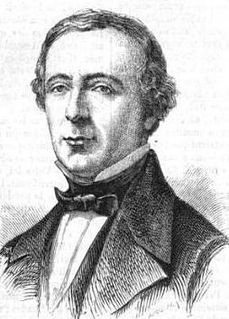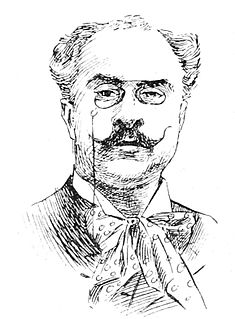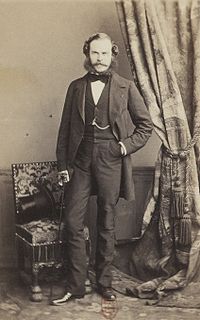 W
WThe Appel au peuple (Plebiscite) was a Bonapartiste parliamentary group during the early years of the French Third Republic. They advocated a plebiscite by which the people would choose the form of government, which they assumed would be a revival of the Second French Empire. They were a significant force in the 1870s and 1880s They were associated with Boulangism and the right-wing Ligue des Patriotes. There was a brief revival of the Appel au peuple in the 1900s. Although the members supported universal suffrage, believed in advancement based on merit rather than birth, and had diverse views on other subjects, they were generally conservative. Many of them believed in the virtues of family, religion, free trade and private property.
 W
WJean-Charles Abbatucci was a Corsican lawyer and politician who was a Deputy for Corsica during both the French Second Republic and the French Third Republic. He was a committed Bonapartist throughout his political career.
 W
WPhilippe La Beaume de Bourgoing (1827–1882) was a French politician. He was the Grand Squire of France to Napoleon III, later serving as Inspector of the Haras Service before being elected five times as the Député for Nièvre in the French Parliament. Stemming from a noble family from the Nièvre, he became a Chevalier of the Légion d'Honneur in 1858, promoted to an officer in 1862.
 W
WMarius Bianchi (1823–1904) was a French politician. He served as a member of the Chamber of Deputies from 1876 to 1881, representing Orne.
 W
WJean-Baptiste Boffinton was a French Bonapartist politician.
 W
WFrançois-Xavier Joseph de Casabianca was a French aristocrat, lawyer and politician who served as Minister of Agriculture and Commerce, Minister of Finance and then President of the Council of State in the government of Louis Napoleon.
 W
WGustave Cunéo d'Ornano was a French lawyer, journalist and politician who was a Bonapartist deputy for the department of Charente for thirty years. He represented the rural constituency of Cognac, and often supported the distillers in parliament. Although he supported democracy, he was in favour of plebiscites and opposed the republicans of the French Third Republic for most of his career. He took every opportunity to speak out against the government in the chamber of deputies. At one point an article he had written led to a duel with another deputy.
 W
WJérôme Frédéric Paul, baron David was the reputed illegitimate son of Jérôme Bonaparte. Throughout his life, he served France in a number of capacities such as; politician and officer. He was also a journalist.
 W
WHenri-Joseph Dugué de La Fauconnerie (1835-1914) was a French politician. He served as a member of the Corps législatif from 1869 to 1870, and as a member of the Chamber of Deputies from 1876 to 1881, and from 1885 to 1893, representing Orne.
 W
WEugène Eschassériaux was a French Bonapartist politician. He was a member of the National Legislative Assembly from 1849 to 1851, of the Corps législatif from 1852 to 1870, of the National Assembly from 1871 to 1876 and of the Chamber of Deputies from 1876 to 1893. He sat with the Appel au peuple parliamentary group.
 W
WLouis Gautier was a French Bonapartist politician who was a deputy for Charente during the French Third Republic.
 W
WRené François Gautier was a French Bonapartiste politician. He was twice deputy of Charente during the French Third Republic.
 W
WBernard Adolphe Granier de Cassagnac was a French journalist and politician.
 W
WPaul Adolphe Marie Prosper Granier de Cassagnac was the son of Adolphe Granier de Cassagnac and Rosa de Beaupin de Beauvalon, and while still young associated with his father in both politics and journalism. In 1866 he became editor of the Conservative paper Le Pays, and figured in a long series of political duels. On the declaration of war in 1870 he volunteered for service and was taken prisoner at Sedan.
 W
WAlphonse Alfred Haentjens was a French industrialist and politician.
 W
WJoachim Napoléon Michel Murat, 6th Prince Murat, was a member of the Bonaparte-Murat family.
 W
WEugène Jolibois was a French lawyer and politician. He was Bonapartist deputy for Charente-Inférieure from 1876 to 1893.
 W
WJoseph Lachaud de Loqueyssie was a French politician who was deputy of Tarn-et-Garonne in 1877–81.
 W
WJean-Edmond Laroche-Joubert was a French industrialist and Bonapartist politician who was deputy for Charente during the Second French Empire and again during the French Third Republic. He developed his family paper manufacturing company into a major industrial enterprise. He was innovative in introducing profit sharing and encouraging his employees to acquire shares in the business.
 W
WLouis Le Provost de Launay was a French politician who was Deputy and then Senator for the department of Côtes-du-Nord . He was a right-wing Bonapartist.
 W
WArthur Legrand was a French lawyer, public servant and politician who represented Manche in the legislature almost continuously from 1871 to his death in 1916. His political beliefs were Bonapartist and conservative at first, and later he ran as an independent..
 W
WCharles-Alphonse Levert was a French public servant and politician. During the Second French Empire he was a prefect of various departments. During the French Third Republic he served as deputy for Pas-de-Calais between 1872 and 1889. He held right-wing Bonapartist views and consistently voted against the republican governments.
 W
WJoachim Joseph André Murat was a French politician who served as deputy for Lot from 1854 to 1889 during the Second French Empire and the French Third Republic.
 W
WAdrien Joseph Prax-Paris was a French politician who was a Bonapartist deputy for Tarn-et-Garonne during the Second French Empire and the French Third Republic.
 W
WEdgar Raoul-Duval was a French magistrate and politician who was Representative of Seine-Inférieure and then twice Deputy of Eure. He had right-wing views, and for most of his career he was a Bonapartist. He was a passionate orator, but somewhat inconsistent in his politics.
 W
WBaron René Charles Reille-Soult-Dalmatie was a French soldier, industrialist and politician. He came from a wealthy military family with mining interests in the south of France. He served in the army until 1869, then went into national politics. He aligned with the right wing Bonapartist group during the French Second Republic.
 W
WEugène Rouher was a French statesman of the Second Empire.
 W
WPierre-Auguste Roy de Loulay was a French advocate and politician who was a deputy in the Second French Empire and the French Third Republic, and was then a senator.
 W
WAlfred de Vast-Vimeux was a French soldier and Bonapartist politician who represented the department of Charente-Inférieure as a deputy during the Second French Empire and in the legislature and the senate of the French Third Republic.